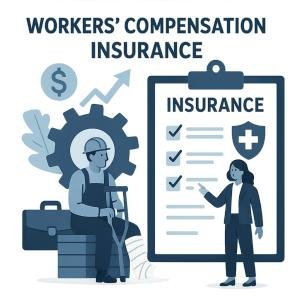
Outsourced Return-to-Work: Pros, Cons & Cost Savings
September 12, 2025In the security industry,safeguarding personnel is as critical as protecting the assets they oversee. Security guard workers’ compensation insurance plays a pivotal role in ensuring that these essential professionals receive appropriate coverage in the event of workplace injuries or illnesses. This comprehensive guide delves into the key aspects of workers’ compensation insurance tailored specifically for security guard workers, offering business owners and risk managers essential insights to navigate compliance, coverage options, and claims management. Whether you are a security firm operator or an industry stakeholder, understanding the intricacies of this insurance is vital to maintaining a resilient and legally compliant workforce.
Table of Contents
- understanding the importance of Workers’ Compensation Insurance for Security Guards
- Key Coverage Components and Risk Factors for Security Guard Workers’ Compensation
- compliance requirements and Legal Obligations for Security Guard employers
- Strategies for Reducing Workers’ Compensation Costs Without Compromising Coverage
- Q&A
- Key takeaways
Understanding the Importance of Workers’ Compensation Insurance for Security Guards
Workers’ compensation insurance serves as a vital safety net for security guards, a profession inherently fraught with risks. From physical confrontations to unexpected accidents on duty, these professionals face hazards that can result in serious injury or illness. This insurance not only covers medical expenses but also ensures that guards receive wage replacement during their recovery period, thereby providing essential financial security. For employers, it mitigates the risk of costly lawsuits, promoting a safer work environment and fostering trust within their workforce.
Key benefits include:
- Coverage for medical treatment related to workplace injuries
- Compensation for lost wages during recovery
- Protection against legal claims from injured employees
- Encouragement of regulatory compliance and workplace safety
| Risk Factor | Potential Impact | Insurance Coverage |
|---|---|---|
| Physical Assault | Severe injury, disability | Medical & Wage Replacement |
| slip and Fall | Broken bones, concussion | Medical Expenses |
| Repetitive Strain | Chronic pain, limited mobility | Rehabilitation Costs |
key Coverage Components and Risk Factors for Security Guard Workers’ Compensation
Understanding workers’ compensation for security guards means recognizing the vital coverage components designed specifically for the inherent challenges of the profession.Coverage typically includes medical expenses, rehabilitation costs, and wage replacement benefits, ensuring that injured guards receive comprehensive support. Additionally, many policies extend to cover occupational diseases and mental health conditions triggered by the high-stress nature of security work. these protections are crucial, considering the unpredictable environments security personnel face daily.
Security guards are exposed to unique risk factors that shape the scope of workers’ compensation coverage. these include exposure to violent encounters, slips and falls during patrols, and hazards related to operating security equipment. The contingency of night shifts and solo assignments further elevates risks, making injury or illness more likely.To illustrate, here’s a fast overview of common risks and corresponding coverage priorities:
| Risk Factor | Coverage Focus |
|---|---|
| Physical assaults | Injury treatment & disability benefits |
| Slip and fall accidents | Medical care & rehabilitation |
| Exposure to hazardous substances | Long-term illness and disability coverage |
| Stress and PTSD | Mental health support and counseling |
compliance Requirements and Legal obligations for Security Guard Employers
Employers in the security guard industry must navigate a complex landscape of regulations to maintain compliance and protect their workforce.Federal and state laws mandate that employers carry adequate workers’ compensation insurance to cover medical expenses and lost wages resulting from work-related injuries. Additionally, adherence to the Occupational Safety and Health Administration (OSHA) standards ensures a safe working environment, reducing liability and enhancing operational integrity. Non-compliance can result in severe penalties including hefty fines, legal action, and suspension of business licenses.
Beyond insurance requirements, security guard employers have several ongoing legal obligations that include:
- Timely reporting of workplace injuries to relevant state authorities
- maintaining clear and accurate documentation of incidents and claims
- Providing mandatory employee training programs on safety protocols and workers’ rights
- Ensuring workers’ compensation policies are regularly reviewed and updated to reflect industry changes
| legal aspect | Employer Responsibility | Consequence of Non-Compliance |
|---|---|---|
| Workers’ Compensation Insurance | Purchase and maintain valid coverage | Fines, lawsuit risk, operational halt |
| OSHA Compliance | Implement safety standards and training | Penalties, increased injury claims |
| Injury Reporting | Submit timely reports to authorities | Loss of insurance benefits, penalties |
Strategies for reducing Workers’ Compensation Costs Without Compromising Coverage
Minimizing expenses on workers’ compensation insurance for security guards requires a proactive approach that balances risk management with policy optimization. One effective method is to implement rigorous safety training programs tailored to the unique challenges faced by security personnel. These programs not only reduce the frequency and severity of workplace injuries but also demonstrate to insurers a commitment to risk mitigation, potentially leading to lower premiums.Additionally, regularly reviewing and updating job classifications can prevent overpayment, as misclassifications frequently enough result in inflated rates due to incorrect risk assessments.
Employers should also explore the advantages of option claims management strategies,such as early intervention and prompt reporting,which can control claim costs and improve recovery outcomes. Engaging with claims administrators who specialize in security industry claims ensures faster resolution and reduces administrative burden. Below is a summary table highlighting key strategies and their benefits:
| Strategy | Key Benefit |
|---|---|
| customized Safety Training | Decreases injury rates, lowers premiums |
| accurate Job classification | Ensures premium reflects true risk level |
| Early Claims Intervention | Reduces claim expenses and downtime |
| Specialized Claims Management | Improves claim outcomes, streamlines process |
Q&A
Q&A: Security Guard Workers’ Compensation insurance - the Ultimate Guide
Q1: What is workers’ compensation insurance for security guards?
A1: Workers’ compensation insurance for security guards is a specialized insurance policy that provides coverage for medical expenses, lost wages, and rehabilitation costs if a security guard sustains a work-related injury or illness. It ensures financial protection for both the employee and employer in case of workplace accidents.
Q2: Why is workers’ compensation insurance important for security guard companies?
A2: Security guard companies face unique risks such as physical confrontations, slip and fall incidents, and exposure to hazardous environments. Workers’ compensation insurance mitigates financial risks associated with employee injuries, helps comply with legal requirements, and promotes a safer workplace by encouraging proper safety protocols.
Q3: Is workers’ compensation insurance legally required for security guards?
A3: in most jurisdictions, workers’ compensation insurance is legally mandated for businesses employing security guards. The specific requirements vary by state or country, but generally, companies with employees must carry this insurance to comply with labor laws and avoid penalties.
Q4: What types of injuries or illnesses are covered under security guard workers’ compensation insurance?
A4: Coverage typically includes injuries resulting from physical altercations, falls, repetitive strain injuries, vehicle accidents during duty, and illnesses caused by workplace conditions such as exposure to hazardous substances or extreme stress.Coverage varies by policy and jurisdiction.
Q5: How are workers’ compensation insurance premiums calculated for security guard companies?
A5: premiums are calculated based on factors such as the company’s payroll size, the security guard risk classification, claims history, and safety measures implemented. Higher risk and claims frequency can lead to increased premiums,while strong safety records can reduce costs.
Q6: What should security guard employers consider when selecting a workers’ compensation insurance policy?
A6: Employers should evaluate the insurer’s reputation, coverage limits, claims handling efficiency, policy exclusions, and cost.Additionally, it is important to ensure the policy covers all types of assigned duties and locations, including off-site work or temporary assignments.
Q7: How does workers’ compensation insurance benefit security guards?
A7: Workers’ compensation insurance provides security guards with timely medical care, wage replacement during recovery periods, and support for rehabilitation. It also offers protection against legal action by employees against their employers for workplace injuries.
Q8: Can security guard contractors or part-time workers be covered by workers’ compensation insurance?
A8: Coverage depends on the employment status and local regulations.Many jurisdictions require coverage for part-time and temporary workers if they are employed by the company. Self-reliant contractors typically need their own insurance unless classified or else by law.
Q9: What steps can security guard companies take to reduce workers’ compensation claims?
A9: Implementing comprehensive safety training, enforcing workplace safety protocols, conducting regular risk assessments, providing proper protective equipment, and promoting a culture of safety all help reduce the frequency and severity of workplace injuries.
Q10: What is the process for filing a workers’ compensation claim as a security guard?
A10: The injured security guard should report the injury immediately to their employer.The employer then files a claim with the insurance provider, which investigates and processes the claim. The guard may receive medical treatment and wage benefits while the claim is being evaluated and resolved.
This Q&A is designed to offer business professionals in the security industry a clear understanding of workers’ compensation insurance essentials, aiding in risk management and compliance.
Key Takeaways
securing comprehensive workers’ compensation insurance is a critical component for any security guard business aiming to protect its workforce and maintain regulatory compliance. By understanding the unique risks faced by security personnel and selecting coverage tailored to those needs, companies can mitigate financial exposure and ensure timely support for injured employees. Investing in the right workers’ compensation policy not only safeguards the business’s operational stability but also reinforces a commitment to employee well-being and professional responsibility. As the security industry continues to evolve, staying informed and proactive about insurance requirements will remain essential to long-term success.
“This content was generated with the assistance of artificial intelligence. While we strive for accuracy, AI-generated content may not always reflect the most current information or professional advice. Users are encouraged to independently verify critical information and, where appropriate, consult with qualified professionals, lawyers, state statutes and regulations & NCCI rules & manuals before making decisions based on this content.







